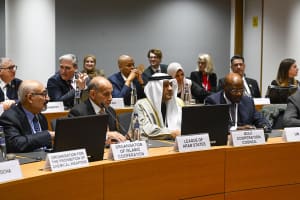Despite growing optimism regarding a hostage deal, significant gaps remain between Israel and Hamas
At least two far-right coalition members promise to oppose the deal, citing risk to Israel's security

As efforts to achieve a hostage release ceasefire deal before U.S. President Joe Biden departs the White House on Jan. 25 continue, CIA Director Bill Burns is expected to arrive in Doha, Qatar to discuss remaining gaps between the Israeli and Hamas positions.
The current negotiations are based on an updated Israeli proposal delivered to Hamas three weeks ago, as part of an Egyptian-led effort to renew the stalled talks.
Some Israeli officials recently expressed optimism that a deal can be reached soon. Israel Hayom reported on Sunday that a senior official told cabinet members that a deal to bring the hostages home could possibly be secured by Hannukah, which begins on the evening of Dec. 25.
Hamas also appeared to indicate its willingness to move forward in the negotiations, releasing a statement that read: “Hamas affirms that, in light of the serious and positive discussions taking place today in Doha under the auspices of our Qatari and Egyptian brothers, reaching an agreement for a ceasefire and a prisoner exchange is possible if the occupation ceases to impose new conditions.”
Despite the reports of progress, significant gaps remain between the sides, including the continued insistence by both the Hamas and Palestinian Islamic Jihad (PIJ) terror groups in Gaza that a hostage release ceasefire agreement result in a permanent ceasefire.
Hamas is reportedly concerned that U.S. President-elect Donald Trump will allow Israel to resume fighting after the end of the first stage of the agreement currently being discussed. That agreement includes a three-phase ceasefire, with the release of some hostages taking place in the first portion.
Prime Minister Benjamin Netanyahu appears convinced that the Trump administration will offer greater support for Israeli interests in resuming the fight against Hamas. Netanyahu said that Israel cannot accept any agreement which keeps Hamas in power in Gaza.
“If we finish the war now, Hamas will return, recover and rebuild itself and attack us again,” the prime minister said last week.
While Hamas has reportedly compromised on the issue of a continued IDF presence in Gaza during the first stage of the deal – allowing some Israeli troops to remain in the Philadelphi and Netzarim Corridors – it is unwilling to compromise on the demand that the first phase lead to a permanent ceasefire.
Senior Israeli officials have also expressed doubts about a deal being closed quickly because of the gaps. One senior Israeli official familiar with the negotiations told Axios, “The gaps are still significant. There are gaps that the negotiation teams can bridge, and that is what they are trying to do now in Qatar. In any case, there is still a long way to go.”
Another Israeli official told the news site that recent comments by Defense Minister Israel Katz, who stated that a deal is “closer than ever” – are not helpful, because it builds a false sense of immediacy among the public.
"It doesn't help the negotiations. It misleads the public and creates false illusions," the Israeli official said.
The Biden administration also seems to be more reserved regarding the chances of achieving a deal soon.
“We believe – and the Israelis have said this – that we’re getting closer, and no doubt about it, we believe that, but we also are cautious in our optimism,” White House Spokesperson John Kirby told Fox News in an interview.
“We’ve been in this position before where we weren’t able to get it over the finish line,” he said.
There is also opposition to the deal within the coalition government. While Katz recently promised a “sweeping majority” for a hostage release deal while speaking to the Knesset Foreign Affairs and Defense Committee on Monday, at least two coalition members have promised to oppose the deal.
Finance Minister Bezalel Smotrich reiterated his opposition to the deal on Wednesday morning, stating in an interview with Kol Rama Radio that the current agreement “is not good for Israel's security.”
“The prime minister knows what our red lines are, we have a great influence on the government's moves,” Smotrich stated. “I'm proud of my ability to conduct substantive discussions, only a donkey doesn't change his mind, there's only one thing in front of my eyes – what's good for the State of Israel.”
Smotrich identified the partial release of hostages as one of the reasons for his opposition to the deal.
“Right now, it's a different deal and it's not one that serves the security of the state or the return of all the hostages,” he continued, “it's problematic in my opinion to decide who will return and who won’t.”
National Security Minister Itamar Ben Gvir also strongly opposes any deal that involves the exchange of a large number of Palestinian security prisoners, saying it would lead to another Oct. 7 event.

The All Israel News Staff is a team of journalists in Israel.
You might also like to read this:
















